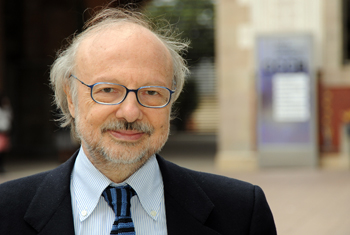When we first came up with the idea, with Josep Ramoneda, of designing an exhibition that would relate Pasolini with the city of Rome, I immediately got in touch with Gianni Borgna. We knew he had been a friend and collaborator of the filmmaker and we were also aware of the great work he had sustained in the field of cultural policy as municipal and regional adviser to Rome’s first governments of the Left. His enthusiasm for the project gave us all the guarantees that we were doing something different and original with respect to previous exhibitions featuring Pasolini, in some of which Gianni himself had been involved. From the very outset, Gianni thought about conceiving the exhibition ‘come un romanzo…’ and that the story’s starting point should be the arrival in Rome by train of Pasolini and his mother, in January 1950, as they fled the political and sexual intolerance that he had suffered in Casarsa.
As the project advanced and gradually became more international, Gianni was especially pleased when he knew that the exhibition would also be presented in Paris, Rome, and Berlin. He also showed great complicity when another curator, Alain Bergala, joined the team: a decision that converted the creative process into a constant and enriching exchange of points of view, which Gianni always cultivated with exquisite refinement. The director of the Cinemathèque Française, Serge Toubiana, in his prologue to the French version of the exhibition catalogue, recalls in detail how Gianni Borgna guided us physically around a geographical reconstruction of Pasolini’s Rome, especially that of the last night of the poet’s life, from the Piazza della Repubblica to the beach at Òstia where he was murdered. And also the emotional, categorical and knowledgeable way in which Gianni explained to us the political implications of that brutal death. As Serge reminded us in that text, those of us lucky enough to be present will never forget those sessions in Rome, where we came to understand the deep relationship between the artist and the nerve centres of its culture, the borgate, the different neighbourhoods where he had filmed and lived, and the places he would meet up with other intellectuals of Rome.
We also quickly understood what Gianni Borgna meant for culture in Rome, how he was loved by so many diverse people, all grateful for the cultural awakening he had driven in the times of his political responsibilities at the side of Rutelli, of Veltroni, and even of the president of the Republic, Giorgio Napolitano, all politicians who, in the last few days have expressed their condolences, underlining the profound loss represented by his death. In the interviews that Gianni held with Dacia Maraini, with Ennio Morricone and with Ninetto Davoli, contained in the Pasolini Roma catalogue, one can accurately deduce the scope of his humanistic culture and at the same time, the warm trust shared with all the people who were party to the complicities forged during times of cultural resistance in Rome.
For all of us who have worked with him, we are especially saddened that his death has occurred just two months before the inauguration of Pasolini Roma at the Palazzo d’Exposizioni in Rome, because he was especially looking forward to this pleasure. He had supervised the adaptation of the exhibition to the venue with unremitting enthusiasm, while warning of the importance of the prologue, the fact that people should understand the sombre yet simultaneously hopeful way in which Pasolini arrived in the city, which the poet would absolutely transform absolutely in his own narrativity. Gianni had made us understand exactly that: how Pasolini had revealed to the intellectuals of Rome a city that was different, that was there, with all of its transforming potential.
On the inauguration day, 15 April, Gianni won’t be there, but if we have learned one thing from a process such as this, it is that some people’s deaths are germinal, and that the mark that they leave on a cultural process becomes inerasable. Gianni Borgna made us participate, from Barcelona, in a European project, in an Italy that we felt closer to than ever before. It is lives like his that make you understand the meaning of shared heritage, that of thinking, that of intelligence and that of friendship.








